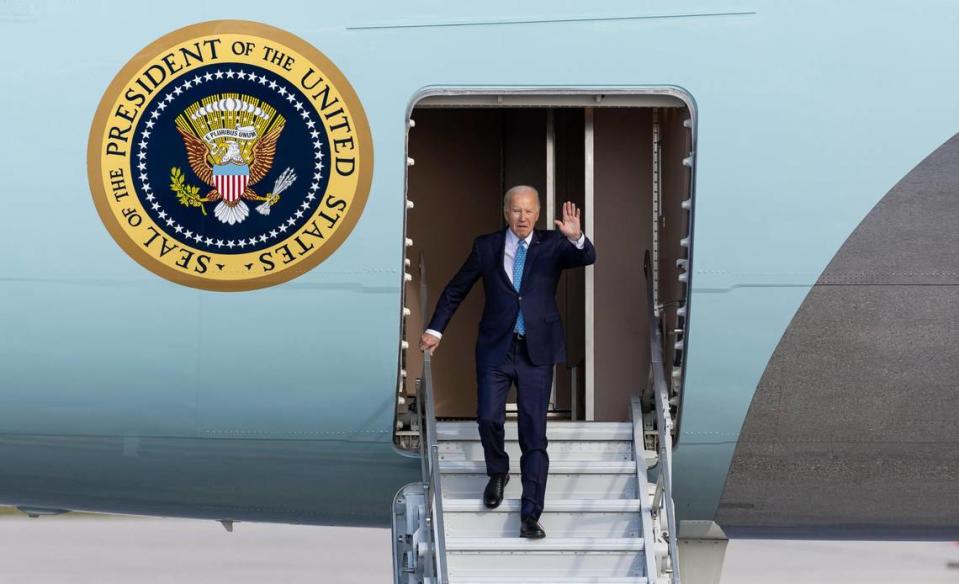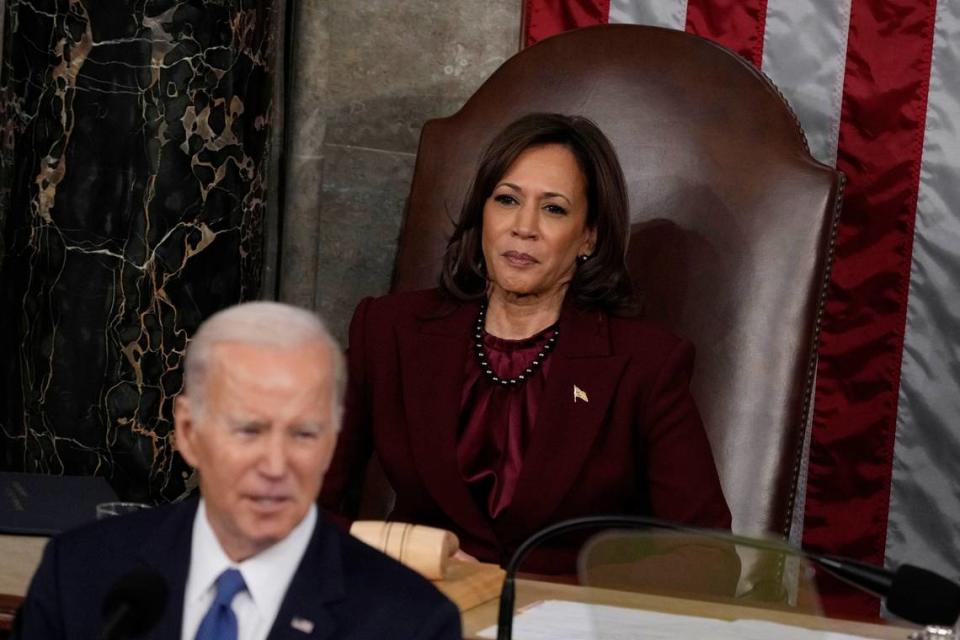Harris vows to earn nomination after Biden bows out of race, throws support behind her
- Oops!Something went wrong.Please try again later.
- Oops!Something went wrong.Please try again later.
President Joe Biden withdrew Sunday from the 2024 presidential race, ending a weeks-long crisis within the Democratic Party over his viability against former President Donald Trump in November after a disastrous debate performance last month laid bare concerns over his age.
In a letter posted on social media and addressed to “my fellow Americans,” Biden, 81, wrote that “it is in the best interest of my party and the country for me to stand down and to focus solely on fulfilling my duties as President for the remainder of my term.”
“It has been the greatest honor of my life to serve as your President,” Biden wrote. “I will speak to the Nation later this week in more detail about my decision.”
— Joe Biden (@JoeBiden) July 21, 2024
In a second statement posted minutes later, Biden threw his support behind his vice president, Kamala Harris, to replace him as the nominee.
“Today I want to offer my full support and endorsement for Kamala to be the nominee of our party this year,” he said. “Democrats — it’s time to come together and beat Trump. Let’s do this.”
My fellow Democrats, I have decided not to accept the nomination and to focus all my energies on my duties as President for the remainder of my term. My very first decision as the party nominee in 2020 was to pick Kamala Harris as my Vice President. And it’s been the best… pic.twitter.com/x8DnvuImJV
— Joe Biden (@JoeBiden) July 21, 2024
Biden had faced growing pressure since his June 27 debate performance in Atlanta from top Democratic lawmakers, who feared Biden’s flagging support risked an electoral wipeout from the White House to both houses of Congress.
The president resisted calls to drop out of the race for several weeks, vowing to stay in as the Democratic nominee after winning the party’s largely uncontested primary. But polling data began to show Biden losing ground in an expanding map of battleground states, wealthy donors started withholding their funds, and leading Democrats in the House and Senate made personal entreaties for him to exit the race, forcing him to reconsider.
Most White House officials found out about the president’s decision from his social media post along with the rest of the public. But one official familiar with Biden’s thinking told McClatchy that he came to a final decision to withdraw over the weekend. Biden spoke with Harris to inform her of his decision before making it public, the official said.
In a statement posted from the Biden-Harris presidential campaign, Harris said she was “honored to have the president’s endorsement.”
“My intention is to earn and win this nomination,” she said. “Over the past year, I have traveled across the country, talking with Americans about the clear choice in this momentous election. And that is what I will continue to do in the days and weeks ahead. I will do everything in my power to unite the Democratic Party — and unite our nation — to defeat Donald Trump.”
Another source said that White House officials are being told by administration leadership that Biden fully intends on completing his term in office, despite growing calls from Republicans for the president to step down over his age.
“Crooked Joe Biden was not fit to run for President,” Trump said in his first reaction to the news, “and is certainly not fit to serve.”
DRAWING HARRIS CLOSE
Biden’s withdrawal is unprecedented: no nominee for president from a major party has exited the race so close to Election Day.
But Biden’s endorsement of Harris signals to the party his desire to avoid an intraparty brawl and unify behind one candidate, with less than four months to go before the general election and with Trump, the presumptive Republican nominee, ahead in polls across all battleground states.
Should the party coalesce behind Harris, she would be able to access Biden’s sizable campaign war chest — a fund otherwise inaccessible to another candidate — and secure ballot access in key states with deadlines that precede the Aug. 19 Democratic convention. Still, Republicans already plan to file legal challenges to thwart any ballot changes in states that are key to victory in November.
A Democratic National Committee source told McClatchy that it was unclear whether any changes to the party process would be required to elevate Harris, but noted the party’s existing rules state that “eligible delegates may vote for the candidate of their choice whether or not the name of such candidate was placed in nomination.”
In a statement, former President Bill Clinton and Secretary of State Hillary Clinton joined Biden in endorsing Harris, saying they “will do whatever we can to support her.”
Biden, the Clintons said, had “capped his extraordinary career of service with a presidency that has lifted America out of an unprecedented pandemic, created millions of new jobs, rebuilt a battered economy, strengthened our democracy, and restored our standing in the world.”
“Now is the time to support Kamala Harris,” they added, “and fight with everything we’ve got to elect her. America’s future depends on it.”
Still others — including former President Barack Obama, former House Speaker Nancy Pelosi and House Minority Hakeem Jeffries — stopped short of endorsing the vice president in their statements.
“We will be navigating uncharted waters in the days ahead,” Obama said. “But I have extraordinary confidence that the leaders of our party will be able to create a process from which an outstanding nominee emerges.”
Even as Biden insisted he would stay in the race under any circumstances, signs emerged shortly after the debate that he was drawing Harris closer than ever.
“She’s not only a great vice president,” Biden said at the NAACP’s convention last week. “She could be president of the United States.”
The vice president joined Biden at a critical meeting with Democratic governors the week after the debate, and joined him to watch the Fourth of July fireworks from the south lawn of the White House — an exclusively family affair in prior years.
Biden began stating in speeches that Harris was prepared to become president if called upon. And when, in private, he opened himself up to the idea of stepping aside, his first question to aides was over Harris’ prospects against Trump in November.
The political crisis dominated press briefings held by White House press secretary Karine Jean-Pierre every time one was held after the debate, with several exchanges with the press corps getting contentious.
In one of the first briefings held after the Atlanta event, Jean-Pierre was asked whether Biden remained committed to remarks he had made in the last election cycle, to serve as a “bridge” to the next generation of the Democratic Party.
“His statement stands,” Jean-Pierre said. “One of the reasons why he picked the vice president, Kamala Harris, is because she is indeed the future of the party.”
TORTURED PATH TO WITHDRAWAL
Consistently behind in the polls, Biden and his campaign pushed for an early debate with Trump in an attempt to reset the race. Instead, Biden’s halting performance on stage in Atlanta on June 27 prompted panic in the party over the president’s declining acuity and stamina. Public polling in the days that followed found three out of four Americans believed Biden was mentally unfit for office.
A day after the debate, Biden rallied supporters in North Carolina and vowed to fight on. “I don’t walk as easy as I used to. I don’t speak as smoothly as I used to. I don’t debate as well as I used to,” he said. “But I know what I do know: I know how to tell the truth.”
“I know right from wrong,” he continued. “I know how to get things done. And I know like millions of Americans know: When you get knocked down, you get back up.”
That weekend, Biden’s family urged him to keep going, and senior campaign aides dismissed calls for him to step aside as an exercise in “bedwetting” — a crisis response that shook Democratic donors and supporters as detached from the reality of shifting public opinion over a campaign that, before the debate, had already been in trouble.
Biden participated in a handful of public events in the following days. But nearly all of them were scripted, reinforcing concerns within the party that he was incapable of holding his own during engagements that are basic to the presidency.
Within a matter of days, Democratic congressmen — fearing Biden’s political collapse could be a drag on their own races — began openly calling on the president to step aside. Democratic leadership phoned Biden for conversations they described as “candid” over the best path forward. But the president doubled down further, vowing to remain in the race in public engagements, telling one television host that his withdrawal from the race was off the table and sending a letter to Democratic lawmakers attempting to shut down talk of alternative paths.
His efforts only temporarily slowed calls for him to leave the race. Two weeks after the debate, as pollsters began producing data showing Virginia, New Hampshire, Minnesota and New Mexico — states that have reliably voted Democratic for over 20 years — could now be competitive, prominent senators began issuing public warnings that Biden could lose in a landslide.
The weekend before the Republican National Convention began in Milwaukee, and hours before an assassination attempt on Trump at a rally in Pennsylvania, Biden held a tense call with moderate Democratic lawmakers and received Senate Majority Leader Chuck Schumer at his home in Delaware. Schumer quietly urged him to consider the bleak electoral picture he faced in the polling data: victory was slipping out of reach. Former House Speaker Nancy Pelosi issued similar warnings in a separate phone call.
Biden announced his withdrawal on Sunday, less than a month away from the DNC.
“Joe has never backed down from a fight,” Obama said in response to the news. “For him to look at the political landscape and decide that he should pass the torch to a new nominee is surely one of the toughest in his life. But I know he wouldn’t make this decision unless he believed it was right for America.”
McClatchy congressional correspondent David Catanese contributed reporting from Washington, D.C.


